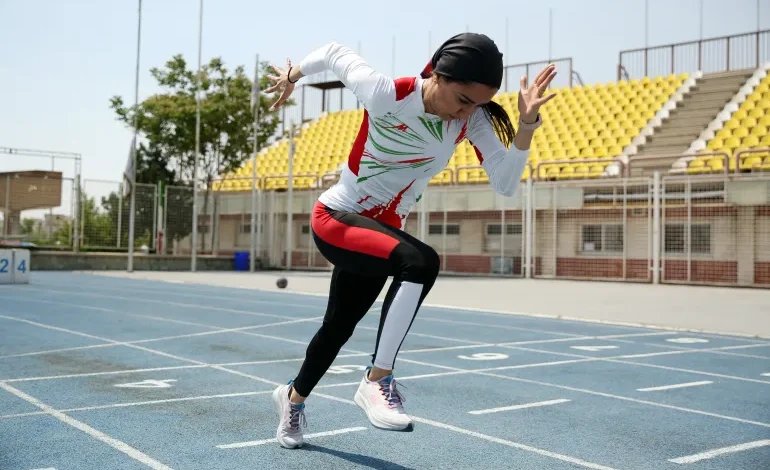Paris 2024 Olympics 100m: Farzaneh Fasihi – Iran’s record-breaking sprinter

It’s 2021, in Konya, Turkey, at the fifth edition of the Islamic Solidarity Games.
Farzaneh Fasihi’s heart races as she bends into position at the start line, the lingering effects of a COVID-19 infection still wearing her down.
Her chest is tight, but she’s determined to compete.
The starter’s gun goes off, and she lunges forward as swiftly as she can, her legs churning faster than ever before.
When she crosses the finish line, she collapses; not from exhaustion, but from the overwhelming emotion of breaking her own 100-metre sprint record, clocking a lightning-fast time of 11.12 seconds to win the silver medal.
“On the night before a race, memories of my life gush through my mind. All the hardships I’ve endured and all my successes pass before my eyes like a film reel,” Fasihi told Al Jazeera, speaking in a Zoom interview from Belgrade, Serbia. She is at a training camp ahead of the Paris 2024 Olympics, which kick off July 26, and where Iran’s fastest female runner of all time will compete in her favourite event, the 100-metre sprint.
Fasihi is no stranger to challenges, but a strong support system in her personal life has seen her through it all.
“I didn’t want to do it’
Born in 1993 in Isfahan, Iran, Fasihi, 31, hails from an athletic family. Her father was a volleyball player, and her brother a swimming and diving champion.
“Before I got married, my father attended all my training sessions,” she recalls. “My mother also attended all my competitions. Without their support, I could not have succeeded.”
“In middle school, my gym teacher forced me to participate in a running competition. I didn’t want to do it,” Fasihi remembers. That day, she broke the Isfahan provincial record, igniting her passion for track and field.
In 2016, she made her international debut.
Fasihi’s team performed well above expectations, winning the silver medal in the 4×400 metre relay at the Asia Indoor Athletics Championship in Doha, Qatar.
But her standout performance did not catapult her sprinting career to new heights. With little support from the Iranian track and field federation, she left it all behind and became a personal fitness trainer.
In 2020, with a support structure now firmly established with Hosseini, Fasihi’s career literally took off.
She participated in the World Athletics Indoor Championships, where the relatively unknown runner scorched the track with a sensational entry record time of 7.29 seconds in the 60-metre sprint held in Belgrade, Serbia.
Not only had Fasihi come out of nowhere to post a fast time – but she had also created history by becoming the first Iranian woman to compete at the championship. Her shock performance in Belgrade was where she was first given the nickname “Jaguar,” a testament to her ferocious speed off the starting block.
A year later, in 2021, she signed with the Serbian athletics club BAK, becoming the first female legionnaire – which effectively means a club signs and sponsors a foreign athlete to relocate and compete for them – in Iran track and field history.
“Becoming a legionnaire was a new path. It was a great risk, but I felt deep inside that I had to do it,” she said, hoping that it would inspire other female Iranian athletes.
Setting the record straight – this one’s ‘for the people’
In 2023, Fasihi would then go on to win gold at the 60-metre race at the Asian Indoor Athletics Championships in Astana, Kazakhstan, clocking a scintillating time of 7.28 seconds.
As outstanding and celebratory as that personal-best performance was – the setting of a new Asian 60-metre sprinting record would ordinarily be cause for wild celebrations – the day would be remembered for something far more profound.
As Fasihi walked to the podium, she turned directly to the camera and shouted: “For the people of Iran. For the happiness of the people of Iran!”
Her moment of protest went viral on social media, with Fasihi declining to carry the Iranian flag and instead bowing her head as she shed silent tears, refusing to sing the national anthem on the victory dias.
This was her statement, or way, to express the tragedy of the young Iranian woman Mahsa Amini, who in 2022 collapsed and died, allegedly after she was detained by Iran’s morality police for wearing an “improper hijab” (headscarf).








